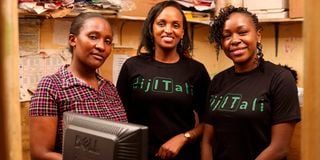Social enterprise seeks to addresses youth unemployment through digital inclusion

Tania Ngima, (middle) with Eudiah Wanjiru (right) a project associate with dijITali. On the left is Mirriam Munee, one of the beneficiaries.
What you need to know:
- The business currently has 430 digital centers in 45 out of Kenya’s 47 counties.
A big number of Kenya’s youths are either unemployed or underemployed. dijITali sees this as an opportunity to innovate by enabling hundreds of cybercafés across the country to provide these youths with sustainable jobs, at the same time giving others access to government services, education and job opportunities as well as enabling them to contribute to the economy through e-commerce.
Founded in April 2020, dijITali, coined from the Swahili word for ‘digital’, is a social enterprise that seeks to address youth unemployment through digital inclusion, primarily focusing on digital centres predominantly run by youth. With seven employees, dijITali supports these centres in capacity building, asset financing and creating income opportunities that they would not be able to access directly.
“We support digital centres to increase and diversify their revenues by tapping into new opportunities, hence creating employment. We also work with B2B clients who are keen on expanding their footprint or capacity into rural and peri-urban areas where we have a wide distribution,’’ says Tania Ngima the Managing Director.
The business currently has 430 digital centres in 45 out of Kenya’s 47 counties.
The firm is currently working with pesakit, BFA global, DOT glasses, Copia and remotasks, and is in contracting and pilot stages with a number of clients who will be utilising the digital centres as a solution to grow and expand their business footprint all over Kenya.
Tania explains that the positive testimonials motivate them - from the digital centres and other clients that have either created new revenue streams by participating in their design classes, by procuring equipment through their asset financing arm or by participating in the training offered on various services including e-government and e-citizen.
The biggest challenge for the business is seeing some of their digital centres lose staff or shut down due to loss of revenue. To stem this, they are creating diversified income opportunities for the digital centres they serve so that they can hire youth for longer periods of time at a fair wage, not just on a temporary basis.
Designing pilots
“We began dijITali at the start of the COVID-19 pandemic. With the restriction on movement, we pivoted to a digital-only model which allowed us much faster progress than if we had relied on offline engagement. We have consistently used online tools to recruit, vet and onboard our now 430-plus strong network,” she says, and adds,
“We spend a lot of time understanding our clients’ needs and designing pilots that make the most commercial sense and impact for them. If one of our clients is interested in recruiting students to test a new app they just launched for studying and revision, we ensure that we have created enough awareness and launched activities that deliver the outcomes that the client is interested in.”
dijITali envisions a future where educational institutions, businesses and SMEs will continually utilise digital centers as B2B partners for all their endeavors. Whether it be for printing of marketing materials, onboarding new customers to a platform or utilising digital centers and pick up points.
“We have over 50 centers that have graduated from our design by dijItali class and have completed three rounds of asset financing for a number of the centers in our network. Together with pivoting to a B2B offering at the height of the pandemic, we have helped our dijITali Centers to create and retain over 100 jobs since we started working with them,” Tania adds.
“Digital centers benefit from the community of 430+ digital centers with a shared vision, goal and income earning opportunities within themselves. They get additional income opportunities from us as we connect them with B2B partners so they can act as the agents or solution centres in those regions where our clients want to access at a competitive cost.”
The entrepreneur explains that the centres participate in customised knowledge and training, learning from a curated list of speakers. They also use this platform to introduce new opportunities to network members.
E-government services
“The training we offer includes e-government services, graphic design, business management skills, asset financing of equipment such as printers, videography and photography assets and gaming equipment to grow their business. Digital centre owners decide which equipment is needed for their business, but we also guide them on the kind of investment they should make depending on which stage of growth they are at.”
Although it is free to join the dijITali network and be part of the community, the cybercafé has to have been in operation for six months and have a basic setup that includes a printer, scanner, copier and two or three computers.
For design by dijITali, a four week course where they get to learn graphic design from scratch, digital center owners pay Sh2, 000. To get asset financing, digital center owners make a monthly repayment fee depending on the cost of the equipment. Repayments vary between nine and 18 months depending on the revenue levels of the digital center.
“When a digital center is able to run successfully, they are able to hire more staff who are mostly youths. This is exactly in line with our vision and mission to help reduce youth unemployment. We work to increase the efficiency of these digital centers so that the community at large (including businesses) is able to get world class service right next to them.”





